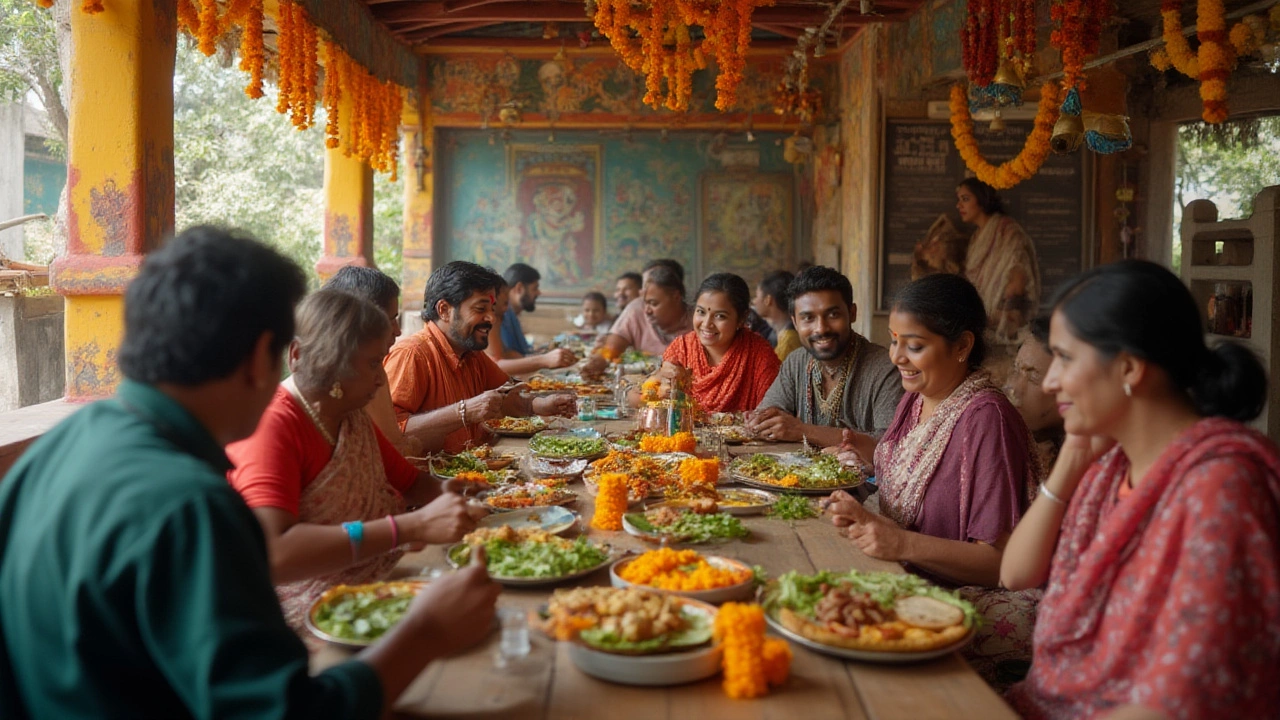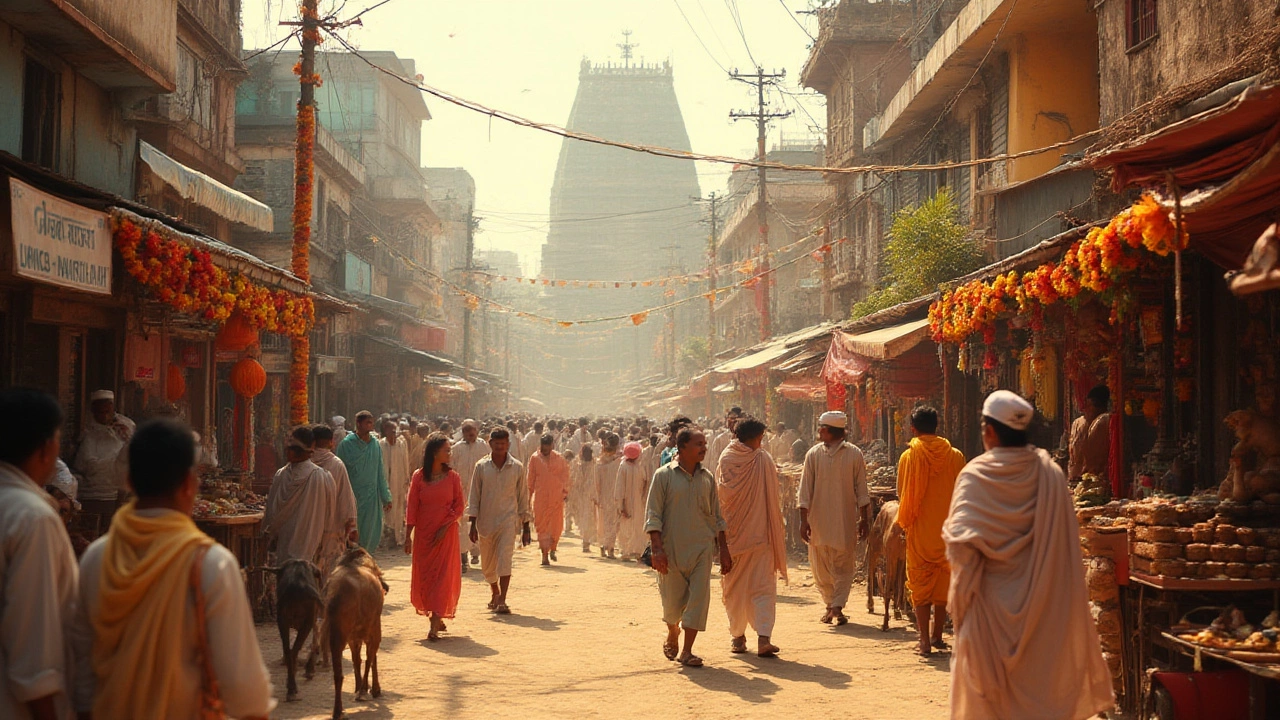If you show up in Vrindavan craving chicken tikka or mutton biryani, you’re in for a surprise. This holy city doesn’t whisper its preferences—it practically shouts them from every street and temple courtyard. For centuries, Vrindavan has been known for its deep spiritual roots and strict vegetarian ethos, which leaves many first-time visitors asking the same thing: Is non-veg food actually banned here, or is it just a local habit? Even foodies who travel to experience cultures through their cuisine find themselves scanning menus that skip entire sections they'd expect elsewhere in India. But why is it this way, and do you risk a penalty for sneaking in that chicken sandwich?
The Spirit of Vrindavan: More Than Just a City
If you think Vrindavan is just another tourist stop, think again. People here wake up to the sound of bells, chant Krishna’s name through the day, and treat cows like family. Vrindavan is considered the heart of Vaishnavism, the tradition that worships Lord Krishna. According to legends, this is where Krishna spent his childhood and played his divine games. For locals and millions of pilgrims, the city isn’t just a dot on a map—it’s a living symbol of spiritual discipline and bhakti (devotion).
This atmosphere influences everything, from street art to daily thali meals. Spirituality here isn’t tucked away inside temples; it's on every corner, in conversations, and even food stalls. Locals take the purity of food—what they call 'satvik'—extremely seriously. Satvik food excludes not just meat and fish, but onions, garlic, and sometimes even mushrooms. Why? The belief is these foods make the mind restless, and that’s the last thing a devotee seeking spiritual calm wants. A 2020 survey by the Braj Foundation showed that almost 93% of Vrindavan’s population identifies as strictly vegetarian—the highest among cities included in the report.
But being vegetarian here isn’t just about religious texts or family traditions—it’s tied to daily life. Grocery shops rarely stock eggs. Most restaurants highlight their vegetarian status in bold letters. If you’re staying at one of the major dharamshalas or guesthouses, you’ll likely see clear signs at the entrance banning non-veg food inside.
Is Non-Veg Food Legally Banned in Vrindavan?
This is where things get interesting—and a little bit confusing. No nationwide Indian law bans non-veg food in holy towns. But every state, and sometimes even city administrations, have their own rules. In Uttar Pradesh, where Vrindavan sits, the government in the early 2010s clamped down hard on meat selling and slaughter in holy cities like Mathura and Vrindavan, as part of a policy to protect the religious character of these places. According to a 2017 directive, the sale and public consumption of meat and alcohol within a 250-meter radius of any major temple in Vrindavan is strictly prohibited.
To make it even clearer, local municipal authorities passed their own orders, making it illegal for anyone to sell meat, fish, or eggs inside city limits. While you won’t find police raiding your backpack for a boiled egg, you will struggle to find any shop that’s willing to risk selling non-veg food. Butcher shops are virtually non-existent. The 2022 Mathura-Vrindavan Nagar Nigam guidelines list heavy fines and closure of business licenses for those caught breaking these rules.
Hotels and restaurants follow these guidelines closely—both out of respect for local sentiment and to avoid any legal trouble. If you try searching for non-veg options on popular food delivery apps here, you’ll usually see either nothing or a polite, “Not available at your location.”
To show how seriously locals treat these rules, here’s a quote from Padmanabh Goswami, head priest of the Radha Raman temple, given to India Today in 2023:
"For generations, Vrindavan has protected its spiritual energy by respecting all living beings. Bringing non-vegetarian food here is not just against the law, it’s against our deepest beliefs."
Certain places just outside the core city, especially on highways, may serve non-veg for travelers passing through, but even then, signage warns you not to take it into temple zones. Statistically, reports from the Municipal Corporation in 2023 stated that less than 0.2% of food outlets in Vrindavan were cited for non-veg violations—proving the rules are strict and mostly unbroken.
| Year | No. of Non-Veg Outlets Fined | Total Food Outlets |
|---|---|---|
| 2021 | 2 | 784 |
| 2022 | 1 | 791 |
| 2023 | 0 | 796 |

The Culture Behind The Ban: Why It Matters to Locals
Walk around Vrindavan at sunrise, and you’ll see lines at flower shops and sweet stalls, not butcher shops or seafood counters. The lack of non-veg isn’t just about legal bans or tradition—it’s personal. For people here, food is a form of worship. Locals see the act of eating itself as an offering to Krishna. How can you offer food that’s taken by harming another life? That’s the logic that underpins almost every menu decision in town.
Most Vrindavan residents belong to Vaishnav communities, which insist on ahimsa (non-violence). Even dairy is sourced from local cows who get temple offerings. Chefs in temple kitchens don’t just cook—they sing hymns as they prepare food, believing that every sound and gesture affects the purity of meals. Some devotees will only eat after offering their plate to Krishna. There are festivals when even root vegetables are avoided, so no one accidentally kills insects underground during harvest. This devotion means no sneaky non-veg ingredients; even mass-market snack packets are checked for hidden egg or gelatin content before being sold in stores.
Travelers sometimes get frustrated when they can’t find their familiar comforts, but Vrindavanites aren’t trying to make things hard for outsiders. The city just wants to preserve what makes it unique. For locals, maintaining a strict vegetarian zone is less about judgment and more about protecting a way of life that’s lasted for hundreds of years. Letting one exception slip would mean breaking something delicate and precious. City elders remember stories of past generations walking miles to keep foods pure, and that pride runs deep.
What Visitors Can Expect: Tips, Alternatives, and Dos & Don’ts
Visiting Vrindavan without any non-veg options might feel daunting for some. But it can turn into a culinary adventure if you’re up for new experiences. Local eateries serve everything from creamy paneer curries to rich milk sweets like peda and malai lassi. You’ll find street food stalls selling aloo tikki, samosas, and the famous khaman dhokla—all strictly vegetarian and bursting with flavor. Don’t skip the prasadam (food offering) served at major temples; it’s profound in taste and the experience is something you won’t find anywhere else.
If you’re planning a longer stay and crave some variety, try exploring global vegetarian spots run by foreigners who’ve turned Vrindavan into their spiritual home—they’re known for fusion thalis, Mediterranean salads, and even vegan pizzas. Health-food cafes offer smoothies, herbal teas, and fresh salads. But remember: public displays of non-veg food—even if it’s homemade and subtle—are frowned upon. Don’t risk clashing with locals by trying to slip animal products into guesthouses or temple premises. Strict vegetarianism is expected in most hotels, and many have policies against using meat, fish, eggs, or even garlic and onion in their kitchens.
If you’re traveling with kids or picky eaters, stock up on packaged vegetarian snacks. Look for the green dot symbol showing the food is vegetarian. Want to cook for yourself? Visit the lively bazaars for seasonal fruits, vegetables, and pulses—you won’t lack for choice or freshness. Avoid bringing packaged non-veg foods from outside, not just to follow the rules but as a sign of respect.
Here’s a simple list to make your food journey smooth in Vrindavan:
- Stick to vegetarian restaurants for hassle-free meals.
- Double-check ingredient labels for hidden animal products.
- Ask locals or hotel staff before preparing or eating outside food.
- Join communal temple meals for the full Vrindavan experience.
- Sample local dairy treats—they’re legendary.
- Plan food for kids or special diets before arriving.
For those with special dietary needs (like vegans), Vrindavan is surprisingly accommodating if you ask the right questions. Local cooks know how to swap ghee for plant oils and cow’s milk for nut-based alternatives when needed.
In the end, visiting Vrindavan means stepping into a living tradition. The non-veg ban isn’t just a rule; it’s a glimpse into what a community can preserve when it truly believes in something. If you’re open to it, you’ll see that the absence of non-veg food isn’t a lack but a reflection of Vrindavan’s history and soulful devotion. Your tummy might miss the meat, but your spirit just might discover something richer along the way.
